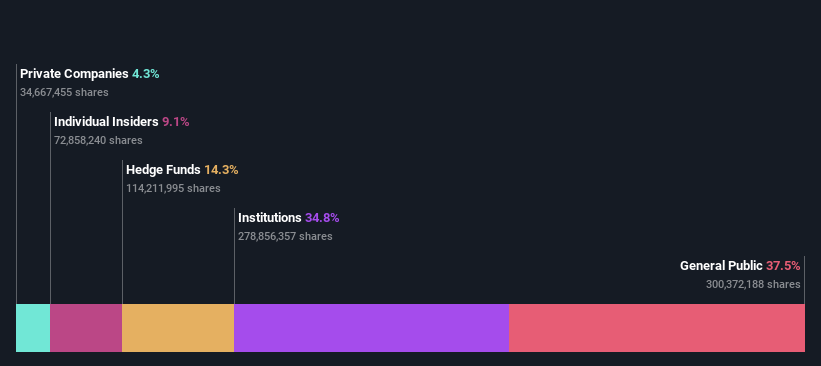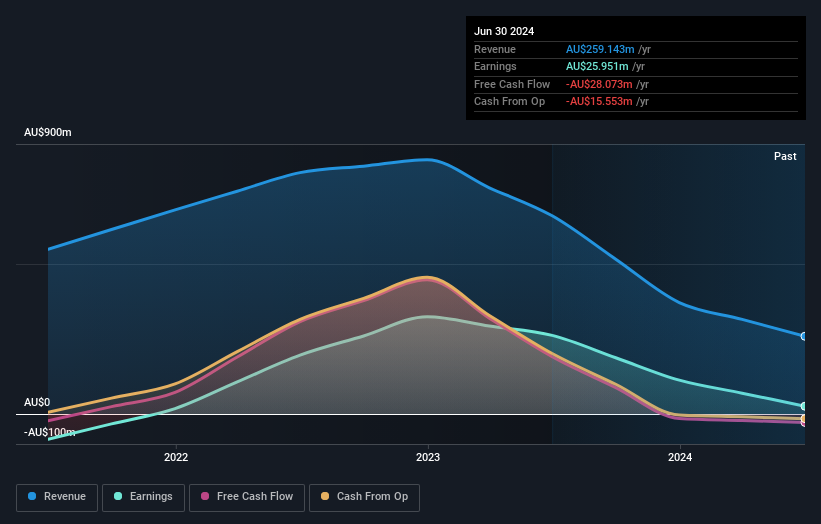- Australia
- /
- Oil and Gas
- /
- ASX:TER
Institutions along with individual investors who hold considerable shares inTerraCom Limited (ASX:TER) come under pressure; lose 11% of holdings value

Key Insights
- Significant control over TerraCom by individual investors implies that the general public has more power to influence management and governance-related decisions
- 51% of the business is held by the top 9 shareholders
- Insiders have bought recently
To get a sense of who is truly in control of TerraCom Limited (ASX:TER), it is important to understand the ownership structure of the business. We can see that individual investors own the lion's share in the company with 38% ownership. In other words, the group stands to gain the most (or lose the most) from their investment into the company.
While institutions who own 35% came under pressure after market cap dropped to AU$164m last week,individual investors took the most losses.
Let's take a closer look to see what the different types of shareholders can tell us about TerraCom.
See our latest analysis for TerraCom

What Does The Institutional Ownership Tell Us About TerraCom?
Institutional investors commonly compare their own returns to the returns of a commonly followed index. So they generally do consider buying larger companies that are included in the relevant benchmark index.
As you can see, institutional investors have a fair amount of stake in TerraCom. This can indicate that the company has a certain degree of credibility in the investment community. However, it is best to be wary of relying on the supposed validation that comes with institutional investors. They too, get it wrong sometimes. It is not uncommon to see a big share price drop if two large institutional investors try to sell out of a stock at the same time. So it is worth checking the past earnings trajectory of TerraCom, (below). Of course, keep in mind that there are other factors to consider, too.

It would appear that 14% of TerraCom shares are controlled by hedge funds. That worth noting, since hedge funds are often quite active investors, who may try to influence management. Many want to see value creation (and a higher share price) in the short term or medium term. Looking at our data, we can see that the largest shareholder is Regal Partners Limited with 14% of shares outstanding. In comparison, the second and third largest shareholders hold about 9.8% and 7.3% of the stock.
We also observed that the top 9 shareholders account for more than half of the share register, with a few smaller shareholders to balance the interests of the larger ones to a certain extent.
While studying institutional ownership for a company can add value to your research, it is also a good practice to research analyst recommendations to get a deeper understand of a stock's expected performance. Our information suggests that there isn't any analyst coverage of the stock, so it is probably little known.
Insider Ownership Of TerraCom
The definition of an insider can differ slightly between different countries, but members of the board of directors always count. The company management answer to the board and the latter should represent the interests of shareholders. Notably, sometimes top-level managers are on the board themselves.
Insider ownership is positive when it signals leadership are thinking like the true owners of the company. However, high insider ownership can also give immense power to a small group within the company. This can be negative in some circumstances.
We can see that insiders own shares in TerraCom Limited. In their own names, insiders own AU$15m worth of stock in the AU$164m company. It is good to see some investment by insiders, but we usually like to see higher insider holdings. It might be worth checking if those insiders have been buying.
General Public Ownership
The general public-- including retail investors -- own 38% stake in the company, and hence can't easily be ignored. While this size of ownership may not be enough to sway a policy decision in their favour, they can still make a collective impact on company policies.
Private Company Ownership
We can see that Private Companies own 4.3%, of the shares on issue. It might be worth looking deeper into this. If related parties, such as insiders, have an interest in one of these private companies, that should be disclosed in the annual report. Private companies may also have a strategic interest in the company.
Next Steps:
While it is well worth considering the different groups that own a company, there are other factors that are even more important. For instance, we've identified 4 warning signs for TerraCom (1 is potentially serious) that you should be aware of.
Of course this may not be the best stock to buy. Therefore, you may wish to see our free collection of interesting prospects boasting favorable financials.
NB: Figures in this article are calculated using data from the last twelve months, which refer to the 12-month period ending on the last date of the month the financial statement is dated. This may not be consistent with full year annual report figures.
Valuation is complex, but we're here to simplify it.
Discover if TerraCom might be undervalued or overvalued with our detailed analysis, featuring fair value estimates, potential risks, dividends, insider trades, and its financial condition.
Access Free AnalysisHave feedback on this article? Concerned about the content? Get in touch with us directly. Alternatively, email editorial-team (at) simplywallst.com.
This article by Simply Wall St is general in nature. We provide commentary based on historical data and analyst forecasts only using an unbiased methodology and our articles are not intended to be financial advice. It does not constitute a recommendation to buy or sell any stock, and does not take account of your objectives, or your financial situation. We aim to bring you long-term focused analysis driven by fundamental data. Note that our analysis may not factor in the latest price-sensitive company announcements or qualitative material. Simply Wall St has no position in any stocks mentioned.
About ASX:TER
Slightly overvalued with imperfect balance sheet.
Similar Companies
Market Insights
Community Narratives



